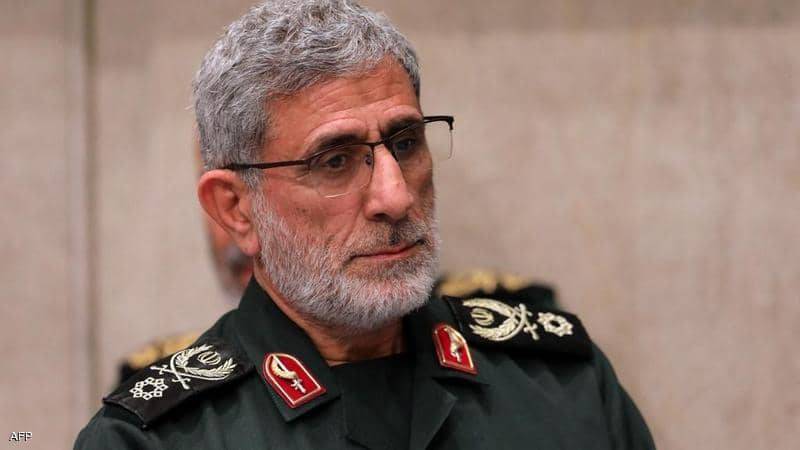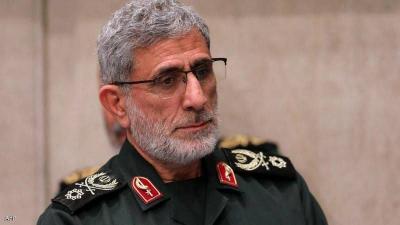Under the title "What Messages Are Conveyed by the Visit of the Commander of the 'Quds Force' to Iraq?", Sky News reported that the commander of the Quds Force of the Iranian Revolutionary Guard, Ismail Qaani, is conducting a secret visit to Iraq to meet with leaders of armed factions following the announcement by Prime Minister Mustafa Al-Kadhimi regarding the shift of the U.S. mission from combat to advisory roles. Qaani's visit comes after the conclusion of the fourth and final round of strategic dialogue and the announcement of its outcomes after a press conference held on Monday, attended by U.S. President Joe Biden and Al-Kadhimi.
Iraqi security sources stated that "the commander of the Quds Force in the Iranian Revolutionary Guard, Ismail Qaani arrived in Najaf province on Tuesday morning and held his first meetings with armed militia leaders, including: the leader of the Asa'ib Ahl al-Haq, Qais Khazali, the leader of Sayyid al-Shuhada Brigades, Abu Alaa al-Walayi, representatives from the Badr Organization, Saraya al-Khorasani, and Kata'ib Hezbollah."
A source, who requested anonymity, told Sky News Arabia that "the dialogue resulted in several matters, most notably: the cessation of bombing foreign facilities and international coalition missions, pushing the government and political blocs to form a committee to monitor the U.S. withdrawal, and executing the agreement between Al-Kadhimi and Biden, in addition to demanding governmental commitments to implement the points stated in their agreement."
It was noted that Qaani arrived in Baghdad on Tuesday evening and held another round of discussions with armed faction leaders, such as the head of the Popular Mobilization Forces, Abu Fadak al-Muhandis, as well as discussing elections and political movements with the head of the Badr Organization, Hadi al-Amiri. He is scheduled to head to Damascus afterward.
This visit marks at least the sixth for Qaani to Iraq this year, with the previous one taking place last month, before the military parade carried out by the Popular Mobilization Forces to commemorate their founding, which stirred considerable controversy.
Qaani usually visits the capital Baghdad informally, entering Iraqi territory without a visa, similar to other officials; however, with the arrival of the current government under Mustafa Al-Kadhimi, this practice was refused, forcing Iranian officials to enter formally.
On Monday, President Joe Biden announced that the U.S. would conclude its "combat mission" in Iraq by the end of the year to enter a "new phase" of military cooperation. Biden, during a meeting with Prime Minister Al-Kadhimi at the White House, explained, "By the end of the year, we will not be in a combat mission in Iraq, but our cooperation against terrorism will continue even in this new phase we are discussing."
Biden and Al-Kadhimi met in the Oval Office in their first direct talks as part of the strategic dialogue between the U.S. and Iraq. Despite political welcome domestically in Iraq regarding the outcomes of the strategic dialogue between Baghdad and Washington, armed factions expressed initial rejection of the dialogue's results and stated through their leaders that military operations would continue until confirmation of U.S. withdrawal.
Prior to the final announcement concerning the transformation of combat forces to training and advisory roles, Iraqi armed factions expressed their rejection of this path, considering it an American plan to buy more time and remain longer in the country. Nasr al-Shammari, the deputy secretary-general of "al-Nujaba Movement," one of the factions of the Popular Mobilization Forces, expressed in a television interview total rejection of "any U.S. presence" in Iraq. Al-Shammari threatened to "continue to target U.S. forces in Iraq even after the name change."
Iran-backed factions have intensified their pressure on Al-Kadhimi's government, which is facing increasingly complex crises on the living and economic fronts in the country. The militias view the Iraqi-American agreement with suspicion, questioning the nature of the U.S. presence, the number of remaining troops, and the Iraqi forces' reliance on them. Meanwhile, a media cell known as "Revolutionary Guards Cell" is leading a wide campaign to assert military readiness and the lack of need for any Western support.
Should the U.S. forces withdraw, Iraq would be unable to secure its airspace due to a lack of advanced defense systems, making American support in this regard crucial, while armed groups reject this setup to possibly operate unmanned and manned aircraft, asserting control over the country’s airspace, including the Kurdistan region.
Therefore, Qaani laid out a clear plan during his meeting in Najaf regarding the airfile and the formation of a committee to oversee the U.S. withdrawal process.
Qaani's visit has sparked widespread outrage in political circles, particularly among Sunni leaders, who condemned the visit and questioned its objectives and timing. Iraqi politician and candidate for the "Progress" bloc from the Al-Amiriya area west of Baghdad, Haidar al-Mulla, questioned on Twitter: "What does the presence of the commander of the Revolutionary Guard in Najaf mean? Does Iran allow Abdul-Wahab al-Saedi (the commander of the Iraqi Counter-Terrorism Service) to meet with Iranian leaders and discuss the election process and the formation of a government in Iran?" He added, “Fear God for Iraq, some accidental politicians, and let Iran realize that Iraq is weakening but will not die,” further stating that “Iran's interest lies in respecting Iraq's sovereignty, not encroaching upon it."
In turn, Sunni tribal leader and politician from Anbar province, Ahmed Abu Risha, tweeted: "Can an Iraqi military leader visit Iran, hold a meeting with Revolutionary Guard leaders, discuss Iranian security issues, intervene to evacuate areas of their residents, or approve the return of displaced persons to and from areas within Iran, and does he have the right to intervene in forming the Iranian president's elected government?"




